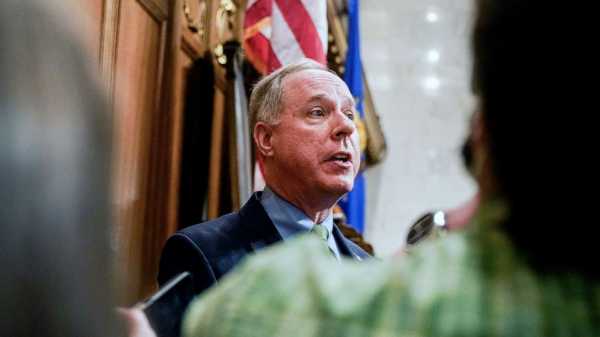Tuesday's primary races — in four states: Connecticut, Minnesota, Vermont and Wisconsin — feature another Donald Trump-Mike Pence proxy battle for governor, another attempt by Trump to oust a state legislative leader for perceived lack of loyalty, a member of the progressive "squad" facing down a primary challenge and a potential barrier-breaking primary in Vermont, the last state in the nation never to send a woman to Congress.
In Wisconsin, several Republicans are hoping to take on incumbent Democratic Gov. Tony Evers in a race with implications for abortion rights and the 2024 election in a politically divided state.
Trump has thrown his support behind Tim Michels, a veteran and co-owner of a construction company. Michels has been pitching himself as a political outsider, even though this is not his first run for public office.
Michels has avoided saying whether or not he would try to attempt the impossible and reverse Trump's defeat in the 2020 election, something that other Trump endorsees have said that they plan to do.

Former President Donald Trump takes the stage at the Conservative Political Action Conference in Dallas, Aug. 6, 2022.Brian Snyder/Reuters
Michels' opponent Rebecca Kleefisch, a former two-term lieutenant governor, is backed by Pence and former Gov. Scott Walker. Kleefisch initially said President Joe Biden was legitimately elected, but she has since baselessly claimed the election was "rigged" — comparing it even to the NFL "Deflategate" scandal.
Both candidates have hardline stances on abortion access, with the two supporting the state's 1849 abortion ban, which criminalized abortion and banned doctors from performing the procedure unless it was to save the mother's life.
The state's Senate primary race is essentially over for both parties, with Lt. Gov. Mandela Barnes clearing the once-crowded field of Democratic opponents to position himself as the presumptive nominee. He will most likely face-off against Republican Sen. Ron Johnson, who faces no serious challenger in the primary.
Johnson is considered one of the most vulnerable GOP incumbents facing reelection this year. Democrats see his state as one of their best opportunities to flip a seat in Congress' upper chamber. Barnes is the state's first Black lieutenant governor and if he wins in November, he would be the first Black U.S. senator from Wisconsin.

Wisconsin Assembly Speaker Robin Vos talks to the media in Madison, Wisc., Feb. 15, 2022.Andy Manis/AP, FILE
Wisconsin's primaries will feature another Trump-Pence split, this time in the 63 State Assembly District race where Trump-backed Adam Steen faces off against Assembly Speaker Robin Vos — who earned Trump's disfavor because he couldn't overturn the 2020 election results in the state, though not because he didn't try.
In Minnesota, Democratic incumbent Rep. Ilhan Omar faces a formidable primary challenger in her third bid for her Congressional seat. The race is the latest example this cycle of a progressive incumbent against a moderate challenger. She and her main opponent, Don Samuels, who is endorsed by Minneapolis Mayor Jacob Frey, have quarreled over hot-button issues such as police reform and Biden's infrastructure plans.
In Vermont, for the first time in history, state voters are almost certain to send a woman to Congress — making it the last in the nation to break the streak. In the primary race to fill the sole House seat of outgoing Democratic Rep. Peter Welch, the top two candidates are Lt. Gov. Molly Gray and state Sen. Becca Balint. Gray is seen as the establishment candidate, backed by Vermont Governor and former Democratic National Committee chair Howard Dean, while Balint is an openly gay progressive who is backed by Sens. Bernie Sanders and Elizabeth Warren.
Sourse: abcnews.go.com






